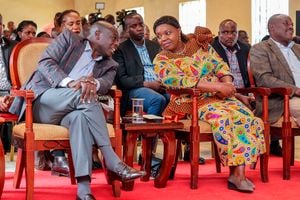I wasn’t ready for the title ‘widow’; but been there, done that

A young woman thoughtfully looks towards the setting sun.Whether you lost your spouse recently or years ago, the grieving and healing process is a journey.
What you need to know:
- Whether you lost your spouse recently or years ago, the grieving and healing process is a journey.
- I wasn’t ready even to write ‘deceased’ when filling a form that requires one to indicate their spouse’s name.
Today is International Widows’ Day, a day ratified by the United Nations to highlight the poverty and injustice faced by millions of widows and their dependants in many countries around the world.
Whether you lost your spouse recently or years ago, the grieving and healing process is a journey. When I lost my husband 17 years ago, I was in my 30s, young and almost clueless about what lay ahead for me and my two young sons.
I wasn’t sure how I’d survive, or if I even wanted to. I wasn’t ready for the title ‘widow’, or even to write ‘deceased’ when filling a form that requires one to indicate their spouse’s name. His death crumbled my foundation and the pain remains unbearable.
I look back now and realise that although the journey hasn’t been smooth, it has served as proof that I can manage things considered difficult. I experienced it, and I got through it. This was only possible because I had no alternative, not because of some phenomenal strength of character. Nevertheless, I survived and I can now share.
The experience of many other widows is different. Despite living in the 21st century, many in Africa still face customs and laws that expose them to extreme poverty, ostracism, violence, homelessness and discrimination.
They are often evicted from their homes, stigmatised and physically abused—some have even been killed. As a result, the lives of many widows are marked by long struggles for their basic rights and dignity.
Sadly, not everyone sees the mistreatment of widows as a violation of human rights. In many cases, the husband’s family, relatives and the local community enforce harmful practices that are ingrained in their culture.
Other violations include humiliating burial rites. We’ve heard heartbreaking stories of ‘cleansing’ rituals where a widow is required to have sexual intercourse with, or be ‘inherited by’, her husband’s relative or some random ‘professional’ inheritor. Often, the assumption is that she is less able to make her own life decision.
Many widows find themselves impoverished. To help them, the Kenyan government launched the Thamini Loan in 2021 to give widows access to interest-free loans. A great move, although I doubt the targeted widows are familiar with the facility. Back to my journey, although I never experienced demeaning cultural rights, I struggled with disappointment and hurt.
One friend could not allow me into her home because I had not been ‘inherited’ and my presence would be a bad omen. Others were uncomfortable with me talking to their husbands. But I thank God for the small circle of friends that God has put on my path. They have been my pillar; women who really care about me and my sons.
All the same, it’s tiring to have to make all decisions on my own. The anniversaries that still take my breath away are tiring. I am, however, glad that I have been strong enough to move forward by owning my entire self and allowing my dreams to come to life.
As we mark International Widows’ Day today, give a struggling widow a shoulder to lean on. They deserve to come out of the shadows.





